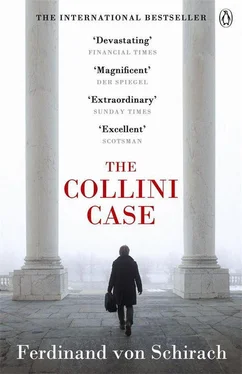‘Coffee just coming up. Hey, you’re early today,’ said the waitress, a pretty Turkish girl. Many stories about her were told in Moabit.
Indeed, Leinen was already in the café by eight, an hour before the opening of the trial. The TV stations had set up their cameras on the pavement near the courthouse; outside-broadcast vehicles were parked there, half on the street; cameramen in thick coats and TV reporters in suits too thin for the weather were standing around in the cold. The teams from the main TV channels had permission to film in the courthouse building itself. Weilers was full of journalists trying to look blasé.
A group of young public prosecutors came into the café. Leinen knew some of them from their two-year training period of work experience. There were the usual jokes about rich lawyers and impoverished servants of the state. Leinen found that no one in ‘Cap’, the Capital Crimes Department of the public prosecutor’s office, expected any surprises.
He finished his coffee and got up to leave. One of the public prosecutors clapped him on the shoulder and wished him luck. When he had paid for his coffee at the counter, he crossed the street to the main entrance, showed the officers on duty his pass to the courthouse and was allowed past the long line of visitors and into the central hall of the complex. He still found it overwhelming: the hall was thirty metres high, a veritable cathedral. The stone statues above the stairwell gazed menacingly down, six allegorical figures of Religion, Justice, Belligerence, Tranquillity, Falsehood and Truth. The idea was to make defendants and witnesses feel small, awed by the power of the law. Even the floor tiles all had the letters KCG engraved on them, the insignia of the Königliches Criminal Gericht, the Royal Criminal Court. Leinen took a lift tucked away in the side wing, went up to the first floor and entered Courtroom 500.
Although it was a perfectly normal working day, about a hundred and thirty people sat crammed close together on the spectators’ benches. The crush of the press was so great that seats for journalists had to be chosen by lot. They would go away disappointed, for usually nothing ever happened on the first day of a trial like this except that the arraignment was read out.
None the less, all the major newspapers had sent their correspondents; Leinen knew none of their faces. Four camera teams were roaming around the hall, filming anything there was to film: stacks of files, legal books, and of course Fabrizio Collini. He sat in a glass cage behind the defending counsel’s bench, and you could hardly see him. These were TV pictures unaccompanied by any commentary.
Dr Reimers, the senior public prosecutor, sat on the window side of the hall, looking at his watch. A thin red folder lay in front of him, containing only the arraignment; nothing else was expected to be dealt with today. It would be a short day in the trial. Next to the public prosecutor, and separated from him by a pane of glass, stood Mattinger, representing the accessory prosecution.
Leinen went to his place, took the document with details of the charge out of his briefcase and placed the white king from Meyer’s chess set on the table in front of him. Johanna was the last to arrive, so that she wouldn’t have to speak to the press. He could hardly bear to see her on the other side from him in this case.
Just after nine the clerk who would be acting as court reporter, taking down the proceedings, said into her microphone, ‘All rise, please.’ When all the spectators and those involved in the trial were on their feet, a smaller door behind the judges’ bench opened. Leinen knew that it led into a conference room furnished with a long table, chairs, a telephone and a washbasin.
The presiding judge was the first to enter the courtroom. Her left hand had a slight tremor. There were five tall chairs at the judges’ bench, and she placed herself in front of the middle one, with a professional judge on each side of her, flanked in turn by the two lay judges. All of them except for the lay judges wore black robes. They stood looking at the camera teams for four or five minutes. ‘Well, ladies and gentlemen, I think that’s enough. Please leave the court now,’ said the presiding judge in a friendly tone. An officer opened the door of the courtroom, two others placed themselves in front of the cameras and spread their arms. ‘You heard what the judge said, please leave the court now.’ Gradually the courtroom calmed down.
‘Is the defendant present?’ the presiding judge asked the court reporter, who was over to her right. She too wore a black robe; she was a young woman, and had tied her hair back in a ponytail.
‘Yes, your honour,’ she said.
‘Right, then we can begin.’ The presiding judge paused for a moment and drew the microphone close to her. ‘I now declare the first session of the 12th Criminal Court in the trial of Herr Fabrizio Collini open. Please sit down.’
After that she established the presence of the others involved in the trial, read out their names and duties, and asked Collini his age, profession and marital status. Finally she turned to the senior public prosecutor and asked him to read the arraignment. Reimers stood to read out the brief text, which lasted hardly fifteen minutes; a murder is quickly described. The presiding judge stated that the district court had allowed the charge of murder to proceed to the main hearing, and told Collini at length about his right to remain silent. The court reporter tapped into her computer: ‘The defendant is told about his rights.’ Then the presiding judge turned directly to Leinen.
‘Counsel for the defence, I’m sure that you have discussed this with your client already. Would the defendant like to say anything?’
Leinen switched on the microphone in front of him, and a small red light showed.
‘No, your honour, Herr Collini doesn’t want to make any statement at this time.’
‘“At this time” – what do you mean? Is the defendant going to make a statement later?’
‘We haven’t decided yet.’
‘Is that what you say yourself, Herr Collini?’ the presiding judge asked the defendant. Collini nodded. ‘Very well,’ she said, raising her eyebrows. ‘Then we have nothing else on today’s agenda. The trial will continue next Wednesday. All of you who are involved are required to attend. This session is now adjourned.’ Placing one hand over the microphone, she added, ‘Dr Reimers, Herr Mattinger, Herr Leinen, please would you wait a moment. I’d like a word with you outside this session of the court.’
Leinen turned to Collini and was about to say goodbye, but his client had already risen to his feet and gone over to the police officers. It was almost fifteen minutes before the courtroom was empty. When the three lawyers were on their own with her, the presiding judge said, ‘Gentlemen, we all know that this is an unusual trial. The victim was eighty-five, the defendant is sixty-seven. He has no previous convictions and has led a blameless life. In spite of lengthy investigations, no motive has been found.’ She looked sternly at Senior Public Prosecutor Reimers, and you couldn’t miss hearing criticism of the work of the public prosecutor’s office in her voice. ‘I want to tell you that I don’t like surprises. If the defence, the prosecution or the accessory prosecution have plans for making a plea or statement of some kind, then this is your opportunity to let the court know.’
The judge, Reimers and Mattinger were looking at Leinen. It was clear that they needed to know Collini’s motive for the killing, and were waiting for Leinen to put a foot wrong.
‘Your honour,’ said Leinen, ‘as you’re aware, all of you have far more experience than I do, and you know that this is my first major brief for the defence. So please forgive me if I ask whether I understand you correctly: are you asking me to tell you at this point how Herr Collini is going to defend himself? As he told you during the session, he prefers to say nothing at this time. Do you want me to tell you more than that now?’
Читать дальше












